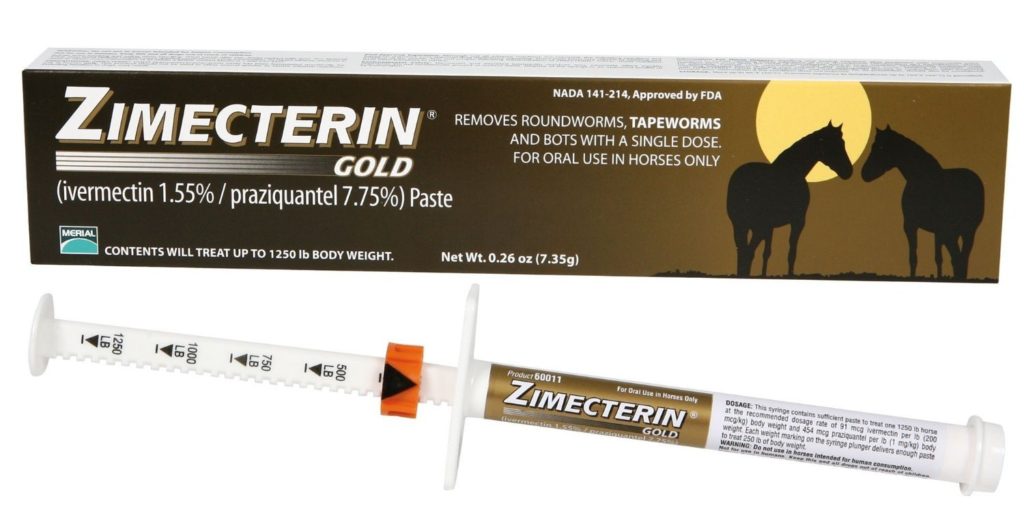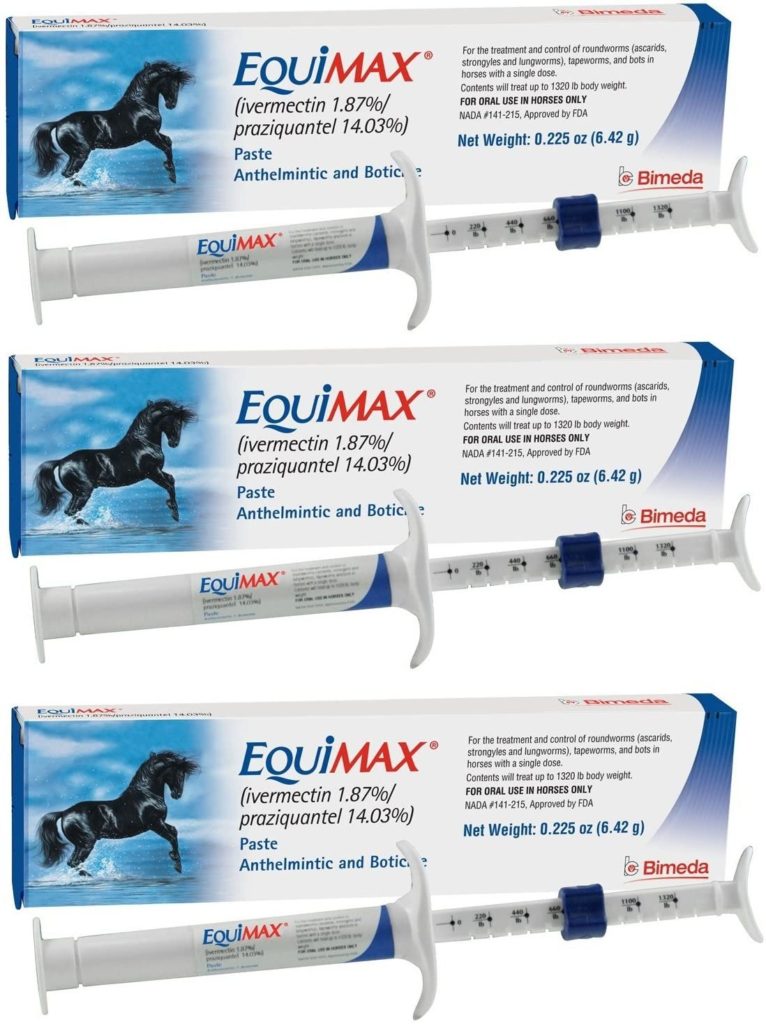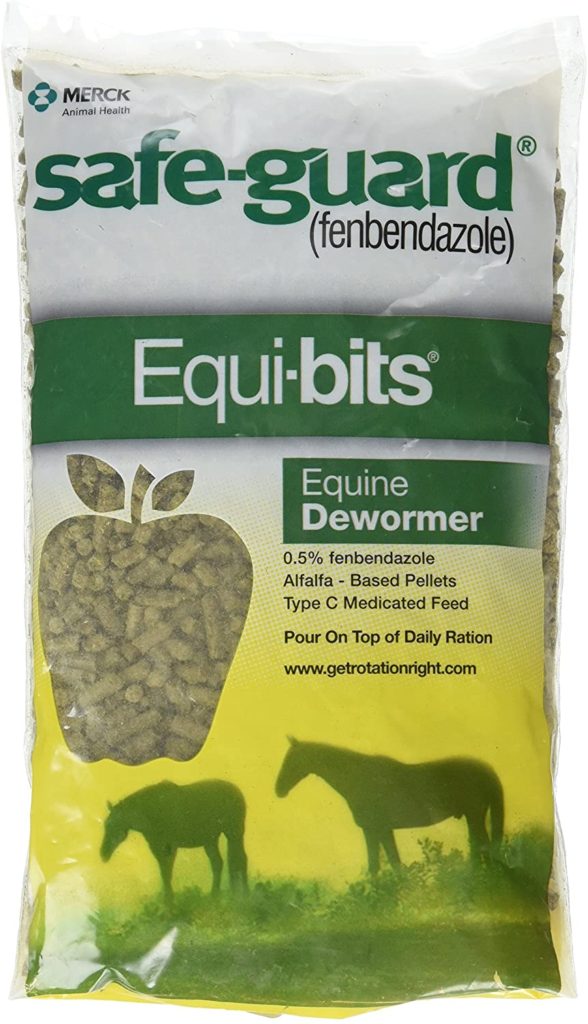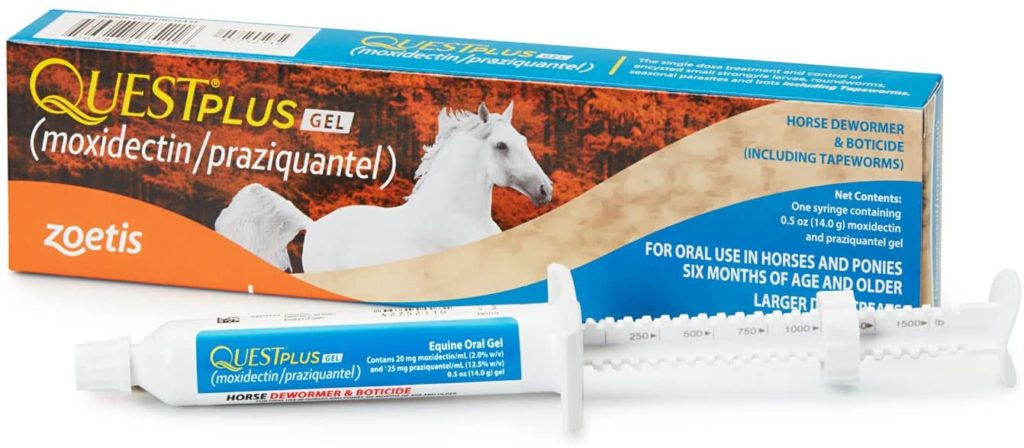Horse owners living in the United States should be very familiar with horse wormers. Horses are susceptible to many types of worms, and worm eggs can also be transmitted to other animals via contact with manure, saliva, or contaminated soil.
There are a number of different ways to treat your horse for worms, but not all treatments are created equal. To help horse owners find the best wormer for their horse’s needs, we have reviewed five different horse wormers and why they stand out from the rest.
1. MERIAL INC – Horse WOrmer 6001120 ZIMECTERIN GOLD DEWORMER For Horse


This ZIMECTERIN GOLD horse dewormer is a single syringe that combines 7.75% praziquantel and 1.55% ivermectin into a single dosage to treat tapeworms in horses.
The active ingredients kill the worms by paralyzing them, blocking their ability to absorb nutrients, or preventing them from maturing to adults.
Side effects are usually mild but may include some diarrhea and increased drooling.
In case of severe side effects, contact your veterinarian immediately.
Removes Tapeworms And Roundworms
This wormer offers a fast-acting solution that won’t let any pesky tapeworms or roundworms take over for the horse who desperately needs to stop scratching. The effective formula removes these parasites quickly, which can help minimize their risk of reinfecting your horse. It’s the best way to take care of your equine friend this season.
Easy To Administer And Effective In A Single Dose
There’s no need to worry about remembering to administer this wormer every day. Instead, you only have to give your horse a single dose once a month. The dose is made for horses, weighing more than 600 pounds. If you have a smaller horse, it’s best to contact a veterinarian before giving the dosage.
Fast-Acting Formula For Quick Relief
The fast-acting formula helps eliminate tapeworms and roundworms quickly, so your horse can get back to normal without worrying that they are at risk of reinfection. The wormer doesn’t stop there either; it also helps prevent fleas and ticks from infecting your horse.
Pros
- Safe to use
- No harsh chemicals
- Contains praziquantel and ivermectin
- Treats 61 kinds of worms and parasites
- No severe side effects
Cons
- Product is overpriced
2. Bimeda Equimax Equien Wormer (3 Pack) Paste Tube – 1.87 Percent Ivermectin and 14.03 Percent Praziquantel


This paste combines two highly effective ingredients to fight a broad range of parasites in your horse. Ivermectin and praziquantel work together to attack tapeworms, roundworms, and bots. The syringe is enough for a horse up to 1,320 lbs., so it’s more than enough for even the largest horse.
The equine paste contains ingredients that effectively kill the following worm species: large strongyles, small strongyles, pinworms, bots, and tapeworms. It also provides protection from many other worms, including roundworm, stomach worm, lungworm, heartworm, and whipworm.
Easy application syringes
Equimax Equine Wormer combines two active ingredients in convenient paste tubes that can be applied to horses with an easy-to-use syringe. The paste works quickly to kill worms and eggs while also lessening the need for deworming medication.
Fights Different Parasites
The product is used as an aid to control infestations with large roundworm, small strongyle, pinworm, tapeworm, and large strongyle adult stages in the horse’s intestine and to prevent infection with these parasites.
Easier To Administer
If you have a horse with a specific type of parasite or worm, this is the medication that is right for your animal. This paste is easier to administer, and with one simple dose, it kills the different types of parasites affecting horses.
Pros
- Pack includes 3 syringes
- Rich in praziquantel and ivermectin
- Easy to apply syringe
- Comes in apple flavor
- Treats different types of parasites
Cons
- Expensive
3. PANACUR (3 Pack) Dewormer Horse Paste 100mg Each


The Panacur Dewormer Paste has been a staple in many horse owners’ medicine cabinets for decades to treat their equines.
The oral dewormer is ideal for all breeds of horses and can be used on foals, pregnant mares, and emaciated horses without any harm.
In treating large strongyles, small strongyles, pinworms, ascarids, hairworms, and bots, PANACUR (3 Pack) Dewormer is a broad spectrum dewormer to cure both internal and external parasites in horses.
Effective Ingredients
Ivermectin, one of its active ingredients, targets and kills large as well as small strongyles in horses, while praziquantel treats ascarids and hairworms. These two ingredients are what make this medication the best horse paste to treat multiple types of parasites in horses.
Suitable For All Types Of Horses
Deworming your horses is important for their health and well-being. Keep them healthy and happy with this Dewormer Horse Paste, formulated to treat the major types of equine parasites found in North America.
Apple-Cinnamon Flavor
This dewormer can be given to your horse with feed or placed directly inside the mouth using a dosing syringe. The apple-cinnamon flavor is enticing enough for any horse breed, so no worries about getting them excited to eat it! It has been proven effective by veterinarians and farmers alike–it’s worth trying out today.
Pros
- Easy to dispense
- Apple-cinnamon flavor is palatable
- Perfect for horses of all sizes and ages
- Controls pinworms, roundworms, and bloodworms
- Safe for pregnant mares
Cons
- Ineffective against tapeworms
4. Safeguard Intervet Horse Dewormer Pellets 1.25-Pound


Safe for use as a single dose treatment, these Safeguard Intervet Horse Dewormer Pellets 1.25-Pound offer a way to deworm your horse in a single step and provide lasting protection against parasites like ascarids, pinworms, and roundworms. These pellets are alfalfa-based and perfect for those who enjoy rotational deworming!
Good For Pregnant Mares
This horse dewormer is safe for use in pregnant mares, foals, and horses under 4 years old. Additionally, the dewormer is safe for use in horses with diarrhea, colic, and in horses that have recently been vaccinated.
Highly Palatable And Convenient
The highly palatable pellets are made to mix into the horse’s feed or water and can be safely administered to horses of all ages. In addition, safeguard Horse Dewormer Pellets will keep your horse healthy and free of parasites.
Easy Administration With Syringe
For ease of administration, these horse dewormer pellets are packaged with a syringe so you can administer the dewormer directly into your horse’s stomach. Within a short period, the horse will be protected against parasites.
Pros
- Can be ideal for breeding stallions
- Palatable apple cinnamon flavor
- Safe and easy to use
- Comes with no harsh chemicals
Cons
- Doesn’t attack tapeworm
5. Quest Plus Praziquantel/Moxidectin Horse Dewormer, 0.5oz Sure-Dial Syringe


Quest Plus Praziquantel/Moxidectin Horse Dewormer is made to kill encysted small strongyle larvae, large strongyles, pinworms, roundworms, hairworms, tapeworms, and stomach worms in horses 6 months or older. The product’s active ingredient is praziquantel, a broad-spectrum antiparasitic agent that destroys adult worms living in the intestines of horses.
Ready-to-use Syringe
The syringe is pre-filled with the product, and the plunger is pulled back to deliver a measured dose according to your horse’s needs making the medication fast and easy to administer.
Safe To Use
In addition to being approved for use in pregnant/nursing mares and breeding stallions, it can be safely administered to all horse breeds regardless of age or condition.
Tailored To Horses’ Needs
Whether your horse is an adult or a baby, the dosage is based on your horse’s needs and can be adjusted as necessary. However, no matter the size of your horse or the condition of his digestive system, you can be sure that Quest Plus Praziquantel Horse Dewormer will be effective.
Pros
- Tempting flavor
- Easy to apply
- Quite affordable
- Formulated in Spain
- Prevents small strongyle production
Cons
- We couldn’t find any negative point regarding this product
How to Choose the Best Horse Wormer | Factors to Consider
Horse wormers are medications given to horses to treat parasites like tapeworms, bots, and grubs. It’s important to know which type of parasite your horse has before you purchase any treatment. If you’re not sure, speak to your vet.
There are different types of horse wormers, and each one is made to treat a specific type of parasite. Some wormers are more effective and safer than others. Here are some things you should know before you buy any horse wormer.
Price
This is probably the most important thing to Consider before buying a horse wormer. The price can vary from $4 to $20 a bottle depending on the brand, the dosage, and whether it’s for large horses or ponies. Also, some wormers have side effects that may be harmful to humans, so be sure that your horse does not have any known side effects before purchasing a wormer for him.
Dosage
Another thing you need to Consider when purchasing a horse wormer is the dosage. Most wormers have a recommended dosage based on your horse’s weight and the type of parasite he has. The dosage needs to be adjusted according to what your vet recommends.
Side Effects
Most wormers are safe for horses, but some may cause side effects such as diarrhea, vomiting, stomach pain, or lethargy. If you notice any kind of unusual behavior in your horse after using a wormer, take him to see his veterinarian immediately.
Overdose
Here is another important Consideration that you need to keep in mind when purchasing a wormer for your horse is whether or not he can overdose on it. Many wormers are formulated to be used in higher dosages than others, so it’s important to know that they don’t have a high enough dosage to cause an overdose.
When To Give A Horse Wormer
Horses are given small doses on two Consecutive days, at least one week apart. If your horse has tapeworms, though, they will be given an entire dose of the wormer each day for five Consecutive days.
How To Administer A Wormer
Different types of horse wormers will require different administration techniques. For instance, some wormers come in a tablet form and need to be crushed and mixed with feed before giving them to your horse. Other wormers come in a liquid form that can be given to your horse orally. This is also true for paste wormers that must be applied directly to the inside of the horse’s stomach or nostril.
How To Deworm Your Horse
1. Check the status of your horse’s intestinal worms. This can be done by either looking at fecal samples or examining your horse’s mouth and stomach. If you see any worms, they should be removed immediately using a dewormer made for horses (like an ivermectin wormer). If you see no worms, you can skip this step.
2. Administer a wormer to your horse’s mouth or stomach using a horse dewormer. Some wormers are administered orally, while others are given to the stomach via a stomach tube that goes down between the esophagus and stomach wall. Make sure you know the instructions on the dewormer you are using and follow them.
3. Wait 24 hours after administering the wormer before feeding your horse to ensure that it has taken effect.
4. Feed your horse a small amount of feed every day, either by hand or through a feeding tube, to maintain weight gain and appetite. If you notice any weight loss or loss of appetite from your horse, call your veterinarian immediately, as this could be a sign that the wormer is not working properly.
5. Continue deworming for three weeks after the last worm is removed from your horse’s system to remove any larvae that may still be present.
6. Monitor your horse’s appetite and weight daily for the next two weeks to ensure that the wormer is effective for your horse. If your equine shows no signs of worms, you can stop deworming and wait until your next worming date.
7. If you notice any worms in your horse’s feces after three weeks of deworming, repeat the process from step one until you are sure that all larvae have been removed from the system properly and no more worms will be developed.
How Often Should I Give My Horse Wormer?
If you’re using a wormer that comes in a liquid form, such as Metaflumizone, give it every three to four weeks, while tablet wormer such as Amitraz every six weeks. On the other hand, if you want to give your horse paste wormer, you should be using it every two weeks.
It’s important to note that worming is a gradual process. If you give your horse medicine every month or two, he will have a higher chance of getting worms again in the future. Give him his first dose of medicine as soon as you notice that he has worms.
Conclusion
Proper horse worming is essential for the health and well-being of your horse. However, with so many wormers to choose from, it may seem impossible to pick the right one. To save you from the hassle of finding out the ideal one, we have reviewed the 5 best horse wormers for you! Do try them out!
FAQs
Question: What wormer kills all worms in horses?
Answer: The wormer that kills all worms in horses is MERIAL INC – Horse WOrmer 6001120 ZIMECTERIN GOLD DEWORMER, which has active ingredients to kill the worms and prevent them from maturing to adults.
Question: What are the symptoms of worms in horses?
Answer: The most common signs of worms in horses are a loss of appetite and weight gain. Other symptoms include a strong odor from the horse’s hair, skin, or urine. In addition, a horse may exhibit coughs and eye irritation. If a worm is swallowed, it can cause intense stomach pain, diarrhea, or colic. If a worm gets into the horse’s lungs, it can cause coughing, nasal discharge, and difficulty breathing.
Question: Where do horses get worms?
Answer: Horses are infected with worms by eating the feces of other horses, which contain eggs and larvae. They are also infected when they eat grass while grazing in contaminated pastures. Larvae can also enter through a cut or sore on their feet or legs, as well as through open wounds on their body.
Question: What are the different types of wormers?
Answer: There are three different types of wormers for horses. They are liquid wormers, paste wormers and tablet wormers. Paste worming is applied directly to the inside of the horse’s stomach or nostril, while tablet and liquid worming can be given orally. The advantage of using liquid or paste wormers is that they can be administered directly into the stomach or nostril without a feed given to the horse.
